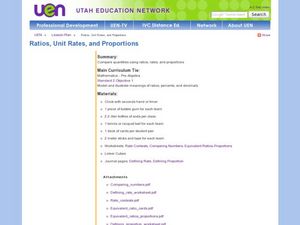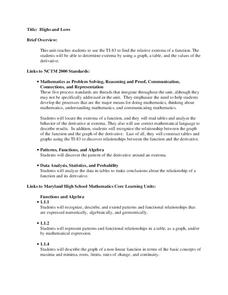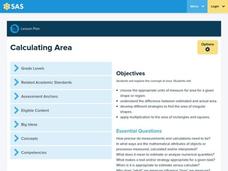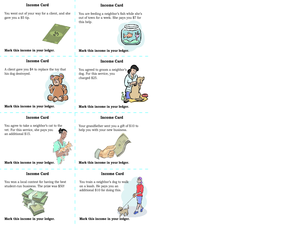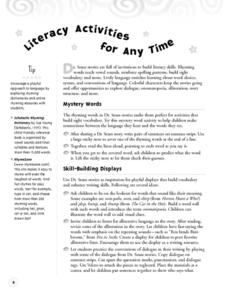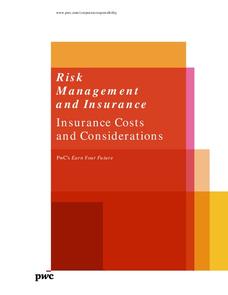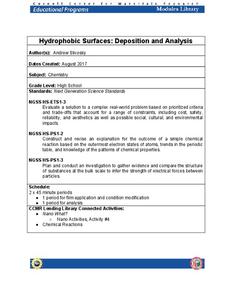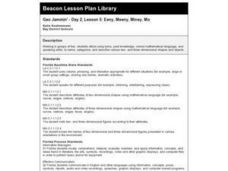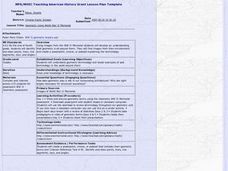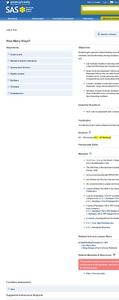Curated OER
Ratios, Unit Rates, and Proportions
Explore the concept of ratios, unit rates, and proportions. Learners convert fractions and percents to decimals. They discuss rates and where they can be found in the real world. A hands-on experiment and numerous flash cards and...
Utah Education Network (UEN)
Simplifying Algebraic Expressions
Sixth and seventh graders explore the concept of simplifying algebraic expressions. They review the order of operations and apply properties to simplify and compare them. The author suggests using a "Boxes Game" as a motivator to get...
Curated OER
Highs and Lows
Solve problems using integration and derivatives. By using calculus, learners will analyze graphs to find the extrema and change in behavior. They then will identify the end behavior using the derivatives. Activities and handouts are...
Curated OER
Finding Volume of Similar Figures
Upper elementary and middle schoolers examine the Volumes of Similar Figures. They investigate the relationship between corresponding sides and evaluate the volume of similar figures. Pupils record their findings on various activity...
Pennsylvania Department of Education
Multiplication Using Arrays
Explore the concept of multiplication by using arrays. Classmates use arrays to gain a better understanding of multiplication. They break arrays apart to model the distributive property of multiplication over addition. The relationship...
Curated OER
Income and Expenses
Students discuss income and expenses. In this lesson on money, students define income and expenses, after whith they keep track of their income and expense transactions on a basic ledger.
Curated OER
Positive and Negative Numbers
Pupils use blocks and markers to illustrate the processes of adding, subtracting, multiplying and dividing integers. In this mathematics lesson, learners use Algebra blocks to demonstrate multiplying polynomials.
Scholastic
Literacy Activities for Any Time
As the title suggests, this packet is loaded with activities that can be used at any time. The common element in all the exercises is that they are connected to books by Dr. Seuss.
PricewaterhouseCoopers
The Stock Market
Keep or sell? Young learners simulate as buyers in the stock market while learning about the benefits and important factors to know when purchasing. The thorough resource allows for observation of case studies and provides an assessment...
PricewaterhouseCoopers
Risk Management and Insurance: Insurance Costs and Considerations
Compare the different types of insurance with high schoolers, and have them learn the benefits and costs of medical, auto, and home policies. The resource addresses what makes some insurances more costly and what teenagers can do to find...
PBS
Stories of Painkiller Addiction: Myth or Fact
Are opioids the most abused drug after marijuana? How hard is it for young people to obtain painkillers without a prescription? Middle and high schoolers explore the growing epidemic of opioid addiction with a lesson that prompts them to...
Cornell University
Hydrophobic Surfaces—Deposition and Analysis
Couches, carpets, and even computer keyboards now advertise they are spill-resistant, but what does that mean? Scholars use physical and chemical methods to coat surfaces with thin films to test their hydrophobic properties. Then they...
Curated OER
Addition Stories
First graders incorporate language expressions, such as first, then, and together into a story and write the math equations that they represent. Concepts for the process of addition are developed using manipulatives, modeling, and...
Curated OER
Worms and more
Students have early length experiences must develop an awareness of what length is, and of the range of words that can be used to discuss length. Young children usually begin by describing the size of objects as big and small. They...
Curated OER
Geo Jammin' - Day 2, Lesson 5: Eeny, Meeny, Miney, Mo
Students, in groups, use song lyrics and math to descrie two and three dimensional shapes.
Curated OER
Are You Absolutely Sure of the Value?
Seventh graders develop an examineing of absolute value through real world situations. They develop an examineing of when absolute value can be used in a given situation.
Curated OER
Sandlapper Solutions
Students use mathematical thinking and reasoning to translate problems into mathematical language and thereby solve the problems. They extend their understanding of whole number operations to fractions and decimals by participating in...
Curated OER
Geometry of The World War II Memorial
Young scholars develop an appreciation of the use of geometry in our everyday world and structures. Students collect various picures and multimedia objcets that explain geometric principles and place them in a powerpoint presentation to...
Curated OER
How Many Ways?
Second graders develop number sense. In this number sense lesson, 2nd graders use multiple ways to represent numbers including written numerals, tally marks and manipulatives. Students correctly use place value to the thousands place.
Curated OER
Getting Graphs: Researching Genealogy-A Piece of Pie
Third graders research their genealogy. In this math lesson, 3rd graders collect data and create graphs and charts. A presentation of their findings is given.
Curated OER
Geometry Scavenger Hunt
Learners use the digital camera, identify geometric shapes (in nature as well as man-made), and gain a better understanding of geometric vocabulary. They search for and recognize geometric shapes in unusual settings
Curated OER
Introduction to Economics
Students develop the concept of supply and demand. In this economics lesson, students listen to a lecture and take notes on supply and demand. Students create a coherent set of notes about supply and demand.
Curated OER
The Great Chile Challenge
Fifth graders gather data, create a graph, and interpret information. They build vocabulary by negotiating the ideas that go into the graphs which they create. They use Excel to print a variety of graphs based on how much they like Chile...
Curated OER
Eye From the Sky
Students are introduced to the concept of aerial perspective and scale. Students will use satellite technology to view their neighborhoods and sketch the area surrounding their schools. They will take part in a neighborhood walk to view...


